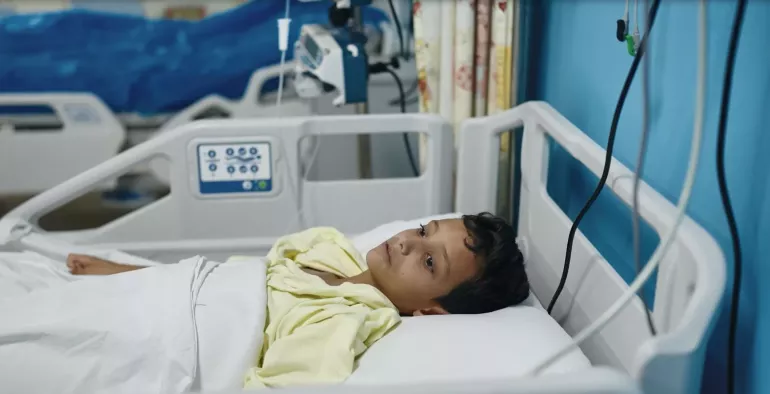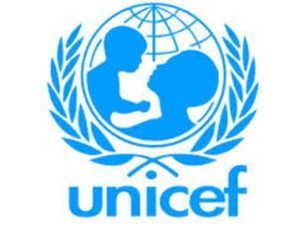“Bloodied, Bruised and Broken” – More Than 690 Children Injured in Lebanon in Last Six Weeks
UNITED NATIONS, 7 Oct 2024
UNICEF - TRANSCEND Media Service

Amir, 8 years old, was injured on 23 Sep 2024 during the dangerous escalation of the Israeli assault on Lebanon. He is being treated at one of Beirut’s public hospitals. UNICEF/UNI655861/Choufany
UNICEF calls for a ceasefire to protect children as physical injuries and psychological suffering rise dramatically.
4 Oct 2024 – More than 690 children have reportedly been injured in Lebanon as the conflict has dramatically escalated in recent weeks.
Since 20 August, the number of children injured in the conflict has increased drastically, bringing the total number injured in the last year to 890 as of 2 October, according to the Lebanese Ministry of Public Health.
“This disastrous conflict is exacting a tremendous toll on children,” said UNICEF Regional Director Adele Khodr. “Doctors tell us of treating children who are bloodied, bruised, and broken, suffering both physically and mentally. Many are experiencing anxiety, flashbacks, and nightmares related to explosions. No child should be subjected to such horrific situations.”
The most common injuries reportedly recorded among children include concussions and traumatic brain injuries from the impact of blasts, shrapnel wounds and limb injuries. Hearing loss caused by explosions is also common.
In the last year at least 127 children have been killed, with more than 100 of these deaths occurring in the past 11 days alone, according to the Lebanese Ministry of Public Health.
“These are not mere numbers. They are innocent children, who had dreams and a future just like anyone else,” adds Khodr.
Meanwhile, it is estimated that more than 400,000 children have been displaced from their homes, grappling with fear, anxiety, destruction, and death in an uncertain and unfamiliar environment, and not knowing when they will return home or go back to school. UNICEF is particularly concerned about the long-term impacts of these events on their mental health.
Lebanon’s health system is under immense strain with the increased number of casualties, and has been directly affected by the conflict with at least 10 hospitals sustaining damage, including one neonatal intensive care unit.
In response, UNICEF has delivered 100 tons of emergency medical supplies, with a further 40 tons expected over the weekend. These supplies are being distributed to hospitals, primary health care centres, pop-up clinics, and first responders, to support life-saving care for families, especially pregnant women and children, across Lebanon. UNICEF is also supporting medical services at 50 shelters and psychosocial support sessions.
Given the scale of needs in Lebanon, UNICEF is urgently appealing to the international community to mobilize humanitarian support and ensure that supply routes into Lebanon remain open, allowing for the rapid and safe delivery of life-saving aid to children in need.
UNICEF continues to call for an urgent ceasefire and urges for all parties to protect children and civilian infrastructure, and to ensure that humanitarian actors can safely reach those in need, in accordance with their obligations under international humanitarian law.
Tags: Anti Zionism, Arms Industry, Bullying, Children, Gaza, Genocide, Hamas, Hezbollah, Human Rights, Iran, Israel, Lebanon, Middle East, Palestine, Proxy War, State Terrorism, Syria, UNICEF, USA, United Nations, Warfare, West Bank, Yemen, Zionism
DISCLAIMER: The statements, views and opinions expressed in pieces republished here are solely those of the authors and do not necessarily represent those of TMS. In accordance with title 17 U.S.C. section 107, this material is distributed without profit to those who have expressed a prior interest in receiving the included information for research and educational purposes. TMS has no affiliation whatsoever with the originator of this article nor is TMS endorsed or sponsored by the originator. “GO TO ORIGINAL” links are provided as a convenience to our readers and allow for verification of authenticity. However, as originating pages are often updated by their originating host sites, the versions posted may not match the versions our readers view when clicking the “GO TO ORIGINAL” links. This site contains copyrighted material the use of which has not always been specifically authorized by the copyright owner. We are making such material available in our efforts to advance understanding of environmental, political, human rights, economic, democracy, scientific, and social justice issues, etc. We believe this constitutes a ‘fair use’ of any such copyrighted material as provided for in section 107 of the US Copyright Law. In accordance with Title 17 U.S.C. Section 107, the material on this site is distributed without profit to those who have expressed a prior interest in receiving the included information for research and educational purposes. For more information go to: http://www.law.cornell.edu/uscode/17/107.shtml. If you wish to use copyrighted material from this site for purposes of your own that go beyond ‘fair use’, you must obtain permission from the copyright owner.
Join the discussion!
We welcome debate and dissent, but personal — ad hominem — attacks (on authors, other users or any individual), abuse and defamatory language will not be tolerated. Nor will we tolerate attempts to deliberately disrupt discussions. We aim to maintain an inviting space to focus on intelligent interactions and debates.
